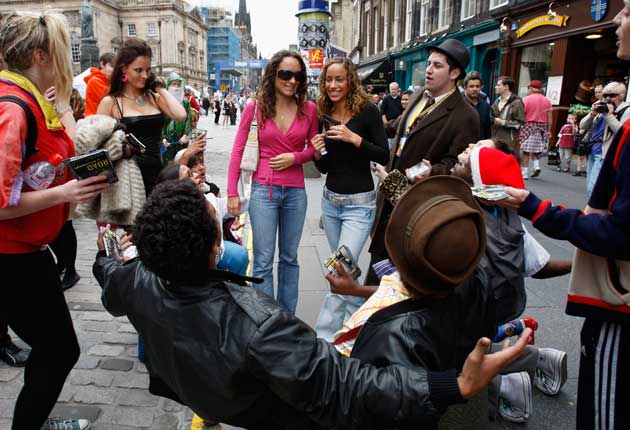Steve Bennett: Noises Off
Comedy is a serious business, but big laughs are guaranteed with a sponsor's help

It wouldn't be the Edinburgh Festival without a row. This year, it's the Fringe Society, the body that oversees the festival, that has been getting it in the neck. The Fringe's fancy new computerised box office system went into meltdown as soon as it went live, and even now there are festival-goers still in search of the tickets they purchased.
Many comedy shows have suffered as a result, but that hasn't stopped the annual dig at the comedians of Edinburgh. Some bright spark has noticed that, for the first time, comedy has officially outstripped theatre: in the Fringe Festival's programme, there are 668 comedy shows to theatre's 593. Cue the familiar comments that comedy is taking over the Fringe.
Then there's the inevitable comedy infighting. This year, the Fringe Festival's four biggest venues – Assembly, Gilded Balloon, Pleasance and Underbelly – put aside their usual rivalry to launch a joint, exclusive programme branded the Edinburgh Comedy Festival, much to the chagrin of the smaller comedy venues.
The aim, so far unsuccessful, is to secure a major corporate sponsor, but critics say the move betrays the spirit of the Fringe. Even so, it's hard to get too worked up when all that it has come to mean is just another brochure to join the blizzard of publicity material distributed around the Fringe.
The punters are not exactly laughing this August either. Besides scarce and expensive accommodation, ticket prices have been intimidatingly high. It's not unusual to have to pay £15 to see one man talk for an hour. And comedy-goers are understandably unwilling to risk a tenner on an unknown. Mid-league venues provide a better bet, with prices at the Stand or C Venues hovering around £8. Still, it's not surprising to hear that audience numbers for the big comedy stars are still healthy, but up-and-coming acts are suffering.
Edinburgh comedy, then, is facing a challenge: can it continue to expand, sell tickets efficiently and at a reasonable price, and attract big names, while maintaining the spirit of the Fringe by accommodating interesting, more experimental, lesser known acts? I hope so – and I think I know how it might be possible.
The last couple of years have seen an explosion in the number of free shows at the Fringe. It's glorified busking, in which pub rooms are converted into makeshift performance spaces where comedians do not pay to play. Audiences are invited to make a donation at the end.
In theory, this is a great idea. In practice, the great acts on this sub-circuit are overwhelmed by too many dreadful ones, attracted to Edinburgh for the craic rather than the work, making it near impossible for audiences to separate the wheat from the chaff. A more discerning booking policy, however, and a more professional approach to running venues, could make the free-comedy movement a major Festival force.
That's all very well for comedy's roots – but what about those a bit further up the tree? A typical mid-range comic act the Fringe might put about £8,000 of their own money on the line. In the Festival's unique economic system, performers
pay thousands to perform to audiences who are overcharged in venues that complain of negligible margins.
This is where sponsorship can help. The big four's attempts to attract sponsorship this year may have failed, but further sponsorship across the Fringe seems inevitable – and it's not necessarily an evil. If a sponsor can offset some of the costs, it means comedians are able to be more creative, venues are improved and ticket prices come down. That's to the benefit of all.
The money could also be used better to promote the Fringe. If there are corporate backers wanting to invest in comedy at Edinburgh, then surely it should be the Fringe Society that should be seeking it in order to benefit all shows, not just the expensive few.
For such an immense, diverse, stimulating, exciting festival, it doesn't get the coverage it deserves. A few telegenic shots of street performers breathing fire on the Royal Mile late on BBC2 or on the arts pages of the broadsheets cannot hope to do it justice.
The society was established as a facilitator to Fringe performers, rather than a proactive organiser. Its brief is limited, but times have changed, and so too should the society. It is already facing tough questions over the box-office fiasco, so now is the time to raise wider issues about how this amazing festival can best be promoted and financed. With big laughs come big responsibilities.
Steve Bennett is the editor of the comedy website chortle.co.uk

Join our commenting forum
Join thought-provoking conversations, follow other Independent readers and see their replies